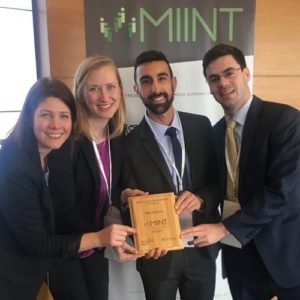Several weeks ago, a team from Ross had the opportunity to compete in the final stage of the 2017 MBA Impact Investing Network and Training (MIINT), an “experiential lab designed to give business and graduate students a hands-on education in impact investing.” The MIINT, a collaboration between the Wharton Social Impact Initiative and Bridges Fund Management, took place at the Wharton School at the University of Pennsylvania in April. The team included three Erb students: Mike Ilardi ’19, Monika Johnson ’19 and Luke Sawitsky ’18, as well as Alli Zimmermann, MBA/MPP ’18. Our team was a delegation from the UM Social Venture Fund (SVF), the country’s first student-run impact investment fund.
The MIINT is a year-long process that begins with participating schools creating teams, researching and selecting a startup on which to conduct due diligence, and working through training modules. These modules include an introduction to impact investing, as well as lessons on sourcing deals, conducting due diligence, measuring impact and structuring investments. The content and timeline of these modules align well with SVF’s internal processes. Twice each week, all SVF members attend training sessions that cover the basics of social venture capital, such as deal structure, term sheets, exit opportunities and social impact analysis. We spend much of the fall screening potential investments—this year, about 150—and then select one of the three companies we advance to due diligence as our entry for the MIINT.
These concurrent, intensive training processes enabled the Michigan team to set the bar for the diligence portion of the MIINT competition and take home the award for best diligence. While we ultimately were unable to recommend investment by the MIINT due to a mismatched investor-investment fit, applying our training bolstered our knowledge base and honed our analytical skills, and we will use all of these experiences to elevate the quality of our work at SVF next year. Ross is one of the few business schools fortunate enough to have an institutionalized impact investment fund, and our success at the competition was a direct result of the peer-led education and hands-on investment experiences we are privileged to have.
The best part of this experience was the opportunity to collaborate with other graduate students who share our passion for building the field of impact investing. SVF defines impact investing as funding innovative companies “that place social and environmental impact at the heart of their business model” and that have the potential to generate competitive financial returns. Our focus is on early-stage companies, in which we make small, direct investments, but this represents only one asset class at a single stage of a business’s life cycle. The broad spectrum of impact investment comprises everything from venture philanthropy to using negative screens to filter out environmentally and socially harmful products from equity investments, and the field is growing rapidly in both complexity and membership.
This was obvious from the 22 teams’ diverse investment theses, pitches, due diligence methods, and criteria for what constitutes a social enterprise. The industries represented ranged from health-tech (virtual psychotherapy, affordable hearing aid substitutes) to agriculture (a marketplace for innovative financing in developing nations), with many ambitious ventures presented by graduate students from around the world. The methods teams used to value the businesses, and to assess each enterprise’s social impact, were similarly diverse.
We found it productive to be in an environment where we could all test each other’s assumptions and opinions about a field that is still being defined. Furthermore, we learned from some of the founding members of this space, who evaluated our analyses and recommendations as judges, while connecting with the next generation of graduate students who are committed to positively changing the way capital markets work.
We joined the Erb Institute with the goal of broadening our experiences, enhancing our skill sets, and positioning ourselves to positively affect society and the environment through business leadership. Our experience with the MIINT was an invaluable opportunity to further hone our abilities in pursuing these goals. While the impact investing space is still nascent, programs like the MIINT are vital to growing this industry and building a pipeline of young professionals who are passionate about using the power of business to make a positive impact on the world. We look forward to raising this bar throughout our careers.
